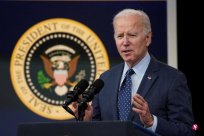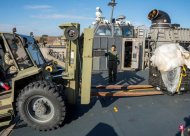(Hague Composite Electric) The United States and China, including the United States and China, have called on all parties to urgently formulate international rules for artificial intelligence (AI) to regulate the military use of AI technology and the use of the war.
The "Responsible Using Artificial Intelligence in the military field" summit jointly organized by the Dutch and South Korea was held in Hague from February 15th to 16th, and about 2,000 representatives of governments, science and technology companies, and civic social organizations attended.
The joint statement issued after the summit pointed out that AI has brought huge opportunities and has extraordinary potential, bringing many benefits to human beings, including making full use of massive data and great improvement of decision -making process.However, many countries in the world are also concerned about the use of AI in the military field. People pay attention to the AI system that may not be reliable, whether humans can participate in problems, inaccurate responsibilities, and potential accidents.
For this reason, the participants agreed to establish a global committee to clarify the use of AI in the war and formulate some guidelines.
Sign signed by the joint statement, developing and using military AI in compliance with international law and not harming international security, stability and accountability.
Experts: Declaration of not being legal binding
However, many human rights experts and scholars have pointed out that this joint statement is not legal binding, and it has not been able to touch the AI guidance of drone autonomous homicide, and AI may exacerbate military conflicts.
At present, in terms of military, most countries have used AI to launch reconnaissance and surveillance tasks; many countries have also used AI to conduct military analysis.In the future, military AI equipment may also decide to attack the target by itself.
The meeting did not invite Russia to participate, Ukraine did not send representatives to attend, and Israeli participating in the meeting did not sign a statement.
Jenkins, deputy Secretary of State, is in charge of military reserve control and international security affairs in the United States, put forward a framework for the responsibility of the country's responsibilities to use military AI, advocating that the AI weapon system should add "moderate human judgment".Jenkins emphasized that the United States is willing to contact any country that intends to join this framework.
The United States and other powerful countries resist the setting of legal restrictions on the use of AI, worrying that it will make them be in a disadvantage when facing the enemy.
The Chinese Ambassador to the Netherlands and the commonly -restrained chemical martial arts representatives, at the meeting, emphasized that the issue of AI military application is related to all human beings' security and well -being, and countries need to be united in all countries.China advocates adhering to the intelligence and goodness, and opposes the use of AI to seek absolute military advantages and hegemony; adheres to people -oriented, abide by international law and ethics, and effectively respect and protect human dignity and human rights.
Duoxi, an assistant professor at the International Law of the University of Wallech University in the Netherlands, said that the United States missed the opportunity to play leadership at the summit. She also believed that the conference statement was weak and weak.Development military AI ... Where is the mechanism for compliance with the rules? "




